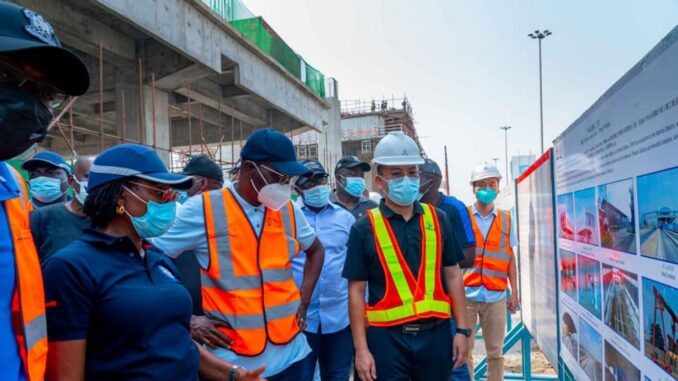
Governor Babajide Sanwo-Olu’s recent statement that the Lagos Blue and Red lines rail would commence operation by the fourth quarter of this year is significant not only for the hope it raises among the state’s residents who have to go through excruciating experience daily to move to and from their livelihood; but also as a major step towards turning Lagos into a megacity and an enviable one at that. Therefore, it will be heart-warming if the governor would keep to his word. On the contrary, it would be hugely disappointing to the people of Lagos if the statement turns out to be more political than practical. Lagosians do need assurance that progress is being made on the long-awaited train service in the bustling mega-city.
The importance of mass transit in Lagos that is teeming with population cannot be overemphasized. With an estimated population of about 20 million, and most of those in the working age bracket having to traverse the state to eke out a living, the daily traffic situation is best imagined than experienced. Moreover, successive governments in the state have not been able to keep to all their promises particularly regarding public transportation. For instance, the state’s promise to build a Fourth Mainland Bridge to ease traffic logjam and people’s movement has remained in the limbo since 1999, almost 23 years after it was made. Similarly, the state has failed to build the Agric-Isawo road to connect Ikorodu to somewhere around Ibafo on the Lagos-Ibadan Expressway. The plan for that road has been in the offing again since 1999 but it is yet to materialise. When and if accomplished, that road is expected to remove more than half of the headache of commuters in that area of Lagos. So far, it is too little too late, but Sanwo-Olu’s promise can still redeem the situation.
A lot still needs to be done to get the train service going. Too little attention has been given to public transportation in this country. Lagos is in a position to lead, as it has done in many instances. The state needs to show more seriousness in its quest for modernisation, given that public transportation through relatively cheap mass transit is a strong way to impact on the people and the state’s economy. Enough of procrastination; enough of promise and fail that have characterised this very important and critical project. It is time to break the Rubicon and see to it that the train service kicks off without further delay.
Sanwo-Olu made the affirmation when he took a tour round the train project where the Red Line begins to Yaba, Ebute Meta and finally to Marina. The Blue Line is designed to commence from Okokomaiko to Marina, while the Red Line routes from Agbado to Marina. The two lines form an integrated train service that is designed to alleviate the herculean intra-city transport challenges that define Lagos.
The desire to build a light rail service in Lagos was first conceived under the Lateef Jakande administration in the early 80s but was frustrated by the Federal Military Government that truncated the Second Republic. Ever since then, the need for such a train service has remained high, but its implementation on the agenda of the state administration has been frustrated. Thus, the Lagos Blue Line project inaugurated about 18 years ago, precisely in 2003, under the Bola Tinubu administration, is coming to life years after the euphoria that greeted its launch has long died off.
The project, part of the Lagos Urban Transportation Project, is being handled by the Lagos Metropolitan Area Transport Authority (LAMATA) with the contract being executed by China’s state-owned China Civil Engineering Construction Corp (CCECC), expected to hand over by December 31, 2022. This corroborates Sanwo-Olu’s assurance about the commencement of the rail service by the fourth quarter of this year.
According to LAMATA, Lagosians should expect a very robust transportation by the end of 2022, with fair price and enjoyable infrastructure in the transport sector. There is no doubt that the long delay in bringing this project to fruition has created anger and hopelessness among Lagosians. Going by the economic power of Lagos State, which is ranked as the sixth largest in Africa, this sort of project ought not to have stalled for this length of time. Obviously, the problem is absence of a political will rather than a deficit of the state’s capacity.
That Lagos is choking with killer traffic gridlock that has defied all solutions is not in doubt. A journey that would normally take about 30 minutes could take a grueling five hours! The excruciating experience makes commuters wonder why a problem that has been there since the 1970s has remained unresolved. Lagos is the commercial nerve centre of Nigeria. But the residents of the city are groaning. Going from one point to another daily is hellish. The situation is worst during the rainy season. It has always been hellish. Lagos traffic gridlock has defied all the measures the authorities have applied over the years. Rather than getting better, it got worse.
However, the authorities cannot afford to be overwhelmed by the intractable traffic situation in Lagos. The government in power should sustain hope that the completion of the Lagos train service would alleviate the problems and make life more pleasurable.
Having promised to deliver the project this year, Sanwo-Olu should do everything to realise it without further delay. The aim of this rail project is to reduce the travel time through an effective and efficient inter-modal transport system. It is also key to the building of a 21st century economy, which is central to the vision of greater Lagos. Anything that would relieve Lagosians of the daily excruciating traffic gridlock would be a major relief.
END

Be the first to comment